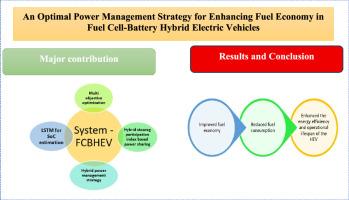An optimal power management strategy for enhancing fuel economy in fuel cell-battery hybrid electric vehicles
IF 4.2
3区 工程技术
Q2 ENGINEERING, ELECTRICAL & ELECTRONIC
引用次数: 0
Abstract
Fuel Cell-Battery Hybrid Electric Vehicles (FCBHEVs) are emerging as a promising solution for sustainable transportation, offering high efficiency and zero tailpipe emissions. Optimizing power distribution between energy sources is essential for improving fuel economy. This paper introduces a hybrid approach that combines optimization techniques with machine learning (ML). It uses LSTM networks for real-time estimation of key battery states, such as State of Charge (SoC), enabling informed decision-making. Additionally, an advanced optimisation layer utilises a weighted multi-objective cost function to minimise system costs and weights while maintaining power balance and operational constraints. To further guide energy sharing between the battery and fuel cell, a Hybrid Storage Participation Index (HSPI) is introduced, quantifying the relative contribution of each energy source over a drive cycle. The HSPI approach aims to improve fuel economy and reduce fuel consumption per 100 km, and also dynamically allocates power demand between the fuel cell and the battery according to real-time operating conditions. The results across various drive cycles demonstrate significant improvements in fuel economy, with reductions of up to 70–73 % compared to conventional rule-based strategies. Furthermore, the proposed strategy enhances vehicle fuel efficiency—measured in litres per 100 km—ensuring better energy utilization and extended system longevity.

提高燃料电池混合动力汽车燃油经济性的最优电源管理策略
燃料电池-电池混合动力汽车(fcbhev)正成为一种有前途的可持续交通解决方案,具有高效率和零尾气排放的特点。优化能源之间的功率分配是提高燃油经济性的关键。本文介绍了一种将优化技术与机器学习(ML)相结合的混合方法。它使用LSTM网络实时估计关键电池状态,如充电状态(SoC),从而实现明智的决策。此外,高级优化层利用加权多目标成本函数来最小化系统成本和权重,同时保持功率平衡和操作约束。为了进一步指导电池和燃料电池之间的能量共享,引入了混合存储参与指数(HSPI),量化了每种能源在驱动循环中的相对贡献。HSPI方法旨在提高燃油经济性,降低每百公里油耗,并根据实时运行情况在燃料电池和电池之间动态分配电力需求。不同驱动循环的结果表明,与传统的基于规则的策略相比,燃油经济性显著提高,可降低70 - 73%。此外,该策略还提高了车辆的燃油效率(以每100公里升数计算),确保了更好的能源利用和延长系统寿命。
本文章由计算机程序翻译,如有差异,请以英文原文为准。
求助全文
约1分钟内获得全文
求助全文
来源期刊

Electric Power Systems Research
工程技术-工程:电子与电气
CiteScore
7.50
自引率
17.90%
发文量
963
审稿时长
3.8 months
期刊介绍:
Electric Power Systems Research is an international medium for the publication of original papers concerned with the generation, transmission, distribution and utilization of electrical energy. The journal aims at presenting important results of work in this field, whether in the form of applied research, development of new procedures or components, orginal application of existing knowledge or new designapproaches. The scope of Electric Power Systems Research is broad, encompassing all aspects of electric power systems. The following list of topics is not intended to be exhaustive, but rather to indicate topics that fall within the journal purview.
• Generation techniques ranging from advances in conventional electromechanical methods, through nuclear power generation, to renewable energy generation.
• Transmission, spanning the broad area from UHV (ac and dc) to network operation and protection, line routing and design.
• Substation work: equipment design, protection and control systems.
• Distribution techniques, equipment development, and smart grids.
• The utilization area from energy efficiency to distributed load levelling techniques.
• Systems studies including control techniques, planning, optimization methods, stability, security assessment and insulation coordination.
 求助内容:
求助内容: 应助结果提醒方式:
应助结果提醒方式:


